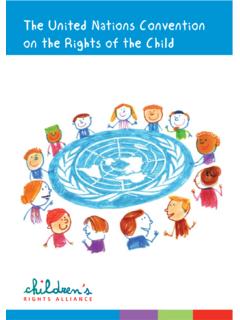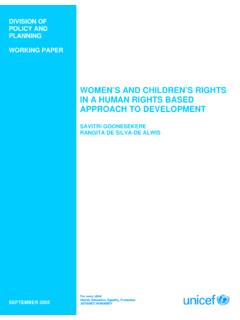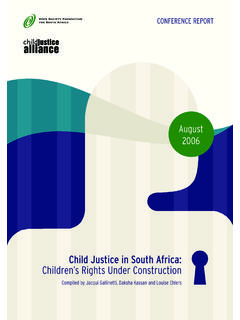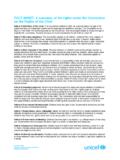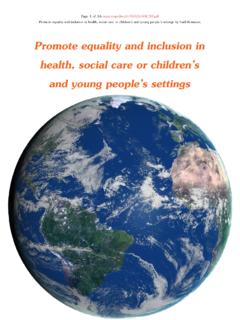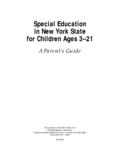Transcription of The Voice of the Child: Children’s ‘Rights’ in Family ...
1 SEPTEMBER [2008] IFL 140 FeaturesThe Voice of the Child: children s rights in Family Proceedings Sir Mark Potter President of the Family Division, England and Wales This article is based on the Lionel Cohen Lecture, Israel, 4 May 2008 In 1989 the United Nations adopted the Convention on the rights of the Child, which has since become the most widely ratified international instrument of all time. It came into force in 1990 and was ratified by the UK in 1991. The importance of the UNCRC is that, by its almost universal ratification, with the notable exceptions of Somalia and the USA, it is evidence of a consensus in the international community about the rights of children and the obligations of the State and the international community to observe and protect them. Universal practice, in accordance with the provisions of the Convention, is of course a very distant prospect. Not only can States be depressingly slow in moving to legislate in accordance with its provisions, if only for bureaucratic reasons; but Art 2(1) provides that the rights under the Convention are provided for all children without discrimination of any kind.
2 That is itself a principle likely to be slow in realisation given the inequalities of treatment within many countries based on gender, religion or ethnic origin. The Convention is largely a compendium of the many fundamental human rights which require recognition in respect of children just as they do for adults, that is to say as human beings vulnerable human beings in the modern world. It deals with rights to nationality, identity, privacy and liberty; it deals with economic and social rights in relation to healthcare and social security. It also sets out the protective rights which are necessary to protect children from violence, drugs, abduction and other forms of exploitation. However, this article is not addressed to the vindication of such fundamental human rights . In the UK a network of legislation recognises and regulates those rights and such legislation is conscientiously applied by courts interpreting the various provisions in the light of their purpose. No doubt in Israel it is the same.
3 The topic of this article is a less basic and more nuanced right than those to which I have referred; it is a right less fundamental than the right of the child to be protected from harm and exploitation. The right is itself predicated and consequential upon proceedings which are founded on concern for the child; it is the right of the child not merely to be the object of such proceedings but to be heard within them. It is specifically dealt with in the Convention, and in the past decade has become the subject of considerable debate among the judiciary and other professionals involved in the Family justice system under the rubric the Voice of the child . I understand that has also been the case in Israel and that, in 2003/04 the Rotlevi Committee, as part of its wide review of the treatment of children within that justice system, published a report entitled The Child and his Family , which recommended a proposed law listing various methods by which the child might be heard and be supported in Family court proceedings, and that presently a pilot project is proceeding in the Family Courts in Jerusalem and Haifa.
4 In that respect, Israel is ahead of the UK and, to Family lawyers familiar with the work of the Rotlevi Committee and the detail of the project now afoot, an exposition of the UK position may appear familiar and well-trodden ground. To you I apologise, but it may be nonetheless that for you, and certainly for others less familiar with the debate, the UK perspective will prove of interest. The UN Convention Article 3(1) of the UNCRC provides that: In all actions concerning children , whether undertaken by public or private social welfare institutions, courts of law, administrative authorities or legislative bodies the best interests of the child shall be a primary consideration. Article 12 goes on to provide that: 1. States parties should assure to the child who is capable of forming his or her own views the right to express those views freely in all matters affecting the child, the view of the child being given due weight in accordance for the age and maturity of the child.
5 2. For this purpose the child shall in particular be provided the opportunity to be heard in any judicial and administrative proceedings affecting the child, either directly, or through a representative or an appropriate body, in a manner consistent with procedural rules and national law. The first point to be made, perhaps, is that while the UK has recognised the Convention, it has not been incorporated into English law, so that individual children cannot themselves seek remedies based on its provisions in the English courts. In any event, the provisions of Art 3(1) and Art 12 are not framed so as to confer autonomous rights upon children in respect of the matters covered; they are a directive to States to secure for the child the right to express the child s views in matters which affect it and in particular the opportunity to be heard in judicial proceedings. In the UK there has been a ready assumption in relation to the process in our Family courts that there SEPTEMBER [2008] IFL 141 Featuresis no further legislative, or indeed judicial, step which needs to be taken in order to comply with the obligations to which I have referred.
6 So far as Art 3(1) is concerned, the obligation that in actions concerning children the best interest of the child shall be a primary consideration is plainly vindicated by the provisions of s 1(1) of the children Act 1989, which provides that when a court determines any question with respect to the upbringing of a child, the child s welfare shall be the court s paramount consideration. So far as Art 12(1) of the Convention is concerned, s 1(3) of the children Act 1989 provides that, whether in private law proceedings between the parties in relation to residence, or contact, or in public law care proceedings taken by a local authority for the purpose of placing a child in care or under supervision, the court shall, among the various considerations listed, have regard to: the ascertainable wishes and feelings of the child concerned (considered in the light of his age and understanding). As to Art 12(2), the provisions of the children Act 1989 provide, in public law proceedings, for the automatic joinder of the child as a party and the appointment of a welfare officer as the child s guardian instructing a lawyer on the child s behalf and, in private law proceedings, for a power in the court to order a welfare report in respect of a child the subject of those proceedings where the parents may not be reliable reporters for that purpose.
7 These provisions have hitherto been considered to be sufficient to afford the opportunity to the child to be heard through a representative, and thus to comply with Art 12. As already noted, Art 12(1) of the Convention stops short of giving even mature children autonomy rights enforceable on the child s own account. While the child is to be afforded a right to express its view freely on all matters affecting it, and must have the opportunity to be heard, the only obligation upon the court is to give the child s views due weight in accordance with its age and maturity. This is wholly in accordance with the approach of the UK in Family proceedings which has historically been paternalistic. There is, so far as I am aware, no statutory provision of UK law nor (outside the field of consent by a mature child to medical treatment) is there any judicial decision, which has recognised any autonomous right in a child to make a decision for himself or herself which is itself dispositive of the court s decision in cases of parental dispute or intervention by a public authority.
8 Background As a brief historic diversion, we have of course come a very long way since the nineteenth century, when the common law accorded the father the position of having near absolute rights over his children , who were essentially a treated as his property over which he could exercise control without consideration for their welfare. As made clear by Professor Stephen Cretney in his masterly history Family Law in the Twentieth Century (Oxford University Press, 2003), Chapter 16, in the absence of intervention by the court, the father of a legitimate child was exclusively entitled to exercise parental authority over that child and the child s mother had no legal right to custody or care and control. Thanks to the efforts of militant women s organisations early in the twentieth century and the part played by women in the First World War, leaders of the political groups dominating the Coalition Government gave an election pledge to remove all existing inequalities of law as between men and women.
9 However, when, in pursuance of that pledge, the Guardianship of Infants Act 1925 was passed, the substantive provisions of the Act still denied a wife equal legal authority over her child during marriage, permitting her only to obtain such authority by seeking a court order. The great step forward, however, from the point of view of both women and children , was that the 1925 Act provided that, if a wife made application to the court for an order concerning the child s custody or upbringing, then in reaching its decision, the court was to regard the child s welfare as the first and paramount consideration and should not take into consideration whether, from any other point of view, the claim of the father was superior to that of the mother or the claim of the mother was superior to that of the father. Thus, although wives did not obtain the full equality they had been promised, the requirement of the court to have regard to the child s welfare as the first and paramount consideration, and to treat the parties equally, enabled the courts freely to award custody, care and control, or orders for contact to the mother, rather than the father, which no doubt usually reflected the wishes of the child.
10 It was not until a landmark decision of the House of Lords in 1970, J and Another v C and Others [1970] AC 668, followed by the Guardianship Act in 1973, that the law gave each parent of a legitimate child equal and separately exercisable rights so that the legal position of married parents in relation to their children was truly equalised. Thus, by the end of the 1980s, when the children Act was passed, the courts were already treating the welfare of the child as the paramount consideration in the sense that all the circumstances of the case were weighed in the balance to determine what order should be made in the best interest of the child. However, as already noted, neither the measures I have mentioned, nor the decisions of judges in relation to disputes involving or concerning children , are based on any concept or recognition of children s rights , but rather on the duty and responsibilities of parents and the court to protect and further their interests. As a matter of history therefore, it is the welfare principle which has been applied so as to dilute and regulate parental rights and authority, but without conferring on children autonomous or substantive rights , and in particular any right to be heard by the court which SEPTEMBER [2008] IFL 142 Featuresdecides their fate.
